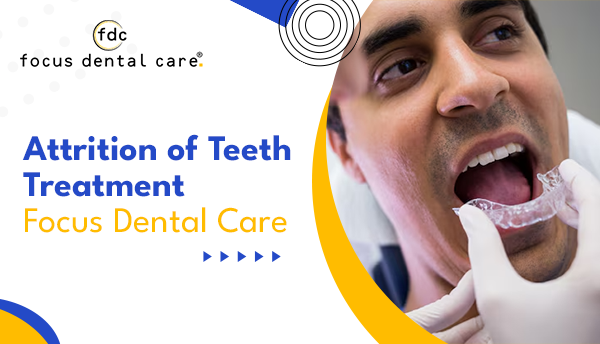Attrition of teeth, a form of tooth wear caused by tooth-to-tooth contact, is a common dental issue that can lead to significant oral health problems if not properly managed. Understanding the causes of tooth attrition and implementing effective preventive and treatment strategies is essential for maintaining oral health. This is particularly relevant where modern lifestyles and dietary habits can contribute to dental issues.
What Causes Attrition in Teeth?
Bruxism (Teeth Grinding):
Bruxism, the involuntary grinding or clenching of teeth, is a primary cause of tooth attrition. This condition often occurs during sleep and can be exacerbated by stress, anxiety, or sleep disorders. The constant grinding forces applied to the teeth lead to the gradual wearing down of the tooth surfaces.
Another cause for attrition is Malocclusion, the improper alignment of the teeth can cause uneven wear of certain teeth. When the upper and lower teeth do not contact together correctly, it creates excessive pressure on specific areas, leading to accelerated attrition.
Dietary Habits:
Consuming hard or abrasive foods, such as nuts, seeds, and certain types of candy, can contribute to tooth wear. Additionally, a diet high in acidic foods and beverages, like citrus fruits and sodas, can weaken enamel, making teeth more susceptible to wear
Age:
As individuals age, natural wear and tear on the teeth can occur. Over time, the cumulative effect of chewing, biting, and other oral activities can lead to noticeable attrition, especially in the absence of good oral hygiene practices.
Poor Oral Hygiene:
Neglecting oral hygiene can exacerbate the effects of attrition. Plaque buildup and gum disease can weaken the structural integrity of teeth, making them more prone to wear and damage.
How to Prevent Attrition of Teeth?
Addressing Bruxism:
For patients suffering from bruxism, We are FDC recommend the use of night guards. These custom-fitted devices create a barrier between the upper and lower teeth, reducing the impact of grinding and clenching. Additionally, stress management techniques, such as relaxation exercises and cognitive-behavioral therapy, can help alleviate the underlying causes of bruxism.
Correcting Malocclusion:
Orthodontic treatments, such as braces or clear aligners, can correct misaligned teeth and ensure a proper bite. By redistributing the forces of chewing evenly across all teeth, these treatments help prevent uneven wear and reduce the risk of attrition.
Dietary Modifications:
Advising patients to avoid hard and abrasive foods can minimize the mechanical wear on teeth. Reducing the intake of acidic foods and beverages and encouraging the consumption of water and foods rich in calcium and phosphate can help strengthen enamel and protect against attrition.
Improving Oral Hygiene:
Emphasizing the importance of good oral hygiene practices is crucial. Regular brushing with fluoride toothpaste, flossing, and routine dental check-ups can help maintain the health of teeth and gums. Fluoride treatments and dental sealants can also provide an extra layer of protection against wear.
Restorative Treatments:
For teeth that have already experienced significant attrition, restorative treatments may be necessary. Dental bonding, crowns, and veneers can restore the shape and function of worn teeth, providing both aesthetic and protective benefits.
Addressing the wearing of teeth requires a concerted effort from dental professionals, public health initiatives, and community education.
Focus Dental Care therefore prioritizes patient education, emphasizing the importance of preventive care and early intervention.
Furthermore, employing recent technological advancements like Digital imaging, CAD/CAM restorations, and minimally invasive procedures can enhance the precision and effectiveness of treatments at our Dental Centre.
Join FDC in adopting a holistic approach that combines preventive care, patient education, and advanced treatments to effectively combat tooth attrition and improve the overall oral health of the community.


